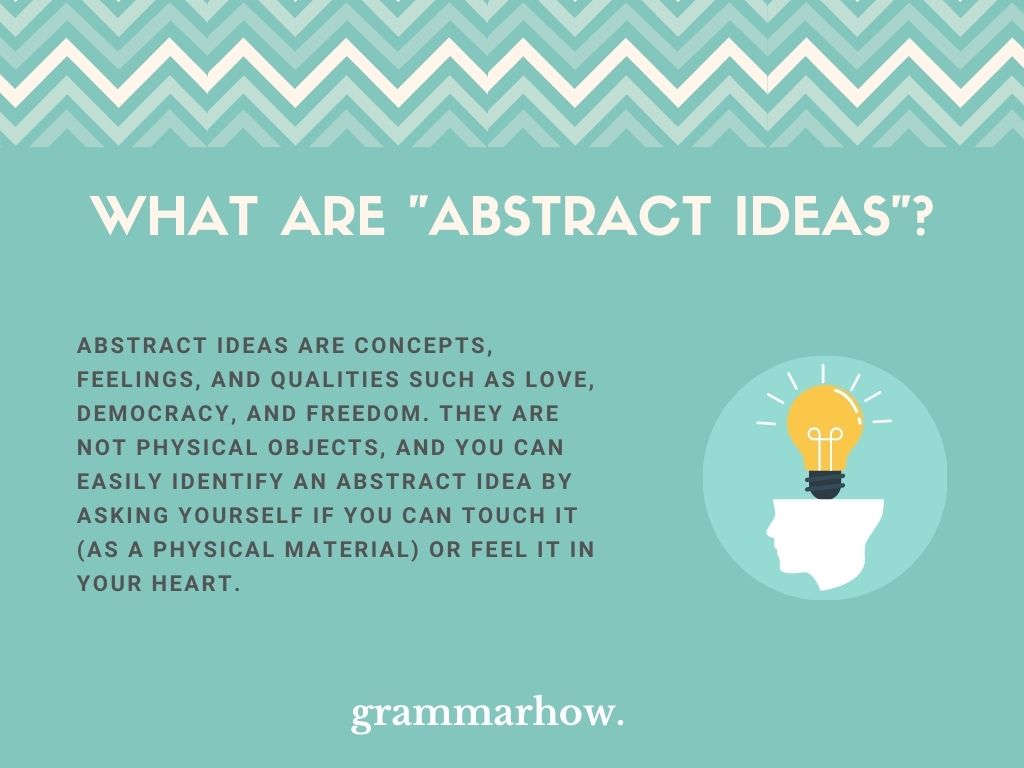Defining Abstract Ideas in 2025: A Comprehensive Guide
Related Articles: Defining Abstract Ideas in 2025: A Comprehensive Guide
- 18th Birthday Party Favors Ideas 2025: Unforgettable Keepsakes For A Milestone Celebration
- Cheap Dinner Ideas For Family 2025
- Cheap And Easy Dinner Ideas For 6 In 2025
- Best Small Business Ideas In India 2025: A Comprehensive Guide
- Cheap Meal Prep Ideas For 2025
Introduction
With great pleasure, we will explore the intriguing topic related to Defining Abstract Ideas in 2025: A Comprehensive Guide. Let’s weave interesting information and offer fresh perspectives to the readers.
Table of Content
Video about Defining Abstract Ideas in 2025: A Comprehensive Guide
Defining Abstract Ideas in 2025: A Comprehensive Guide

In the realm of human cognition, abstract ideas hold a prominent place. They transcend the confines of concrete objects and tangible experiences, embodying concepts that shape our understanding of the world and our place within it. As we approach 2025, the need to define and refine our grasp of abstract ideas becomes increasingly imperative.
The Nature of Abstract Ideas
Abstract ideas are mental constructs that represent non-physical entities, qualities, or relationships. They are not directly observable or tangible, but rather exist as concepts in our minds. Examples of abstract ideas include justice, freedom, love, and infinity.
Unlike concrete objects, abstract ideas cannot be directly perceived through our senses. Instead, we infer their existence and meaning through our experiences, interactions, and cognitive processes. They are often expressed through language, symbols, or other forms of representation.
The Importance of Defining Abstract Ideas
Precisely defining abstract ideas is crucial for several reasons:
- Clear Communication: Accurate definitions facilitate effective communication by ensuring that individuals share a common understanding of the concepts being discussed.
- Logical Reasoning: Well-defined abstract ideas enable us to engage in logical reasoning and draw inferences. By clarifying the relationships between different concepts, we can develop coherent arguments and make informed decisions.
- Cognitive Development: Defining abstract ideas contributes to our cognitive development. By grappling with complex concepts, we expand our mental capacity and deepen our understanding of the world.
- Social Cohesion: Shared definitions of abstract ideas foster social cohesion by establishing common values, norms, and beliefs. They provide a framework for collective decision-making and cooperation.
Challenges in Defining Abstract Ideas
Defining abstract ideas poses several challenges:
- Subjectivity: Abstract ideas are often influenced by personal experiences, cultural background, and individual perspectives. This can lead to variations in their interpretation and definition.
- Multiple Meanings: Many abstract ideas have multiple meanings or nuances, depending on the context in which they are used. This requires careful consideration and disambiguation.
- Vagueness: The boundaries of some abstract ideas may be unclear or difficult to define precisely. This vagueness can lead to ambiguity and confusion.
Methods for Defining Abstract Ideas
Despite these challenges, there are several methods for defining abstract ideas effectively:
- Conceptual Analysis: This involves breaking down the abstract idea into its constituent parts and examining their relationships. By identifying the essential features and properties of the concept, we can develop a more precise definition.
- Operational Definition: This method focuses on defining the concept in terms of observable and measurable criteria. By specifying how the concept can be observed or operationalized, we provide a more concrete understanding.
- Etymological Analysis: Examining the historical origin and evolution of the term used to represent the abstract idea can provide insights into its meaning and usage.
- Comparative Analysis: Comparing the abstract idea to similar or related concepts can highlight its distinctive characteristics and clarify its boundaries.
- Contextualization: Defining the abstract idea within a specific context or domain of knowledge can provide a more nuanced understanding of its meaning and implications.
Defining Abstract Ideas in 2025
As we move towards 2025, defining abstract ideas will become increasingly important for several reasons:
- Technological Advancements: Rapid technological advancements are creating new abstract concepts and challenging our understanding of existing ones.
- Globalization: Increased global interconnectedness is fostering cross-cultural interactions and highlighting the need for shared definitions of abstract ideas.
- Social Challenges: Complex social issues such as climate change, inequality, and artificial intelligence require precise definitions of abstract ideas to facilitate informed discussions and effective decision-making.
Conclusion
Defining abstract ideas is a complex but essential task that requires careful consideration and a range of methodological approaches. By embracing these challenges and refining our understanding of abstract concepts, we can enhance our communication, reasoning, cognitive development, and social cohesion. As we approach 2025, the importance of defining abstract ideas will only increase, as we navigate a rapidly changing and increasingly interconnected world.
![[IMGSRCTITLE2]](https://helpfulprofessor.com/wp-content/uploads/2023/01/abstract-thinking-examples-and-definition.jpg)
![[IMGSRCTITLE3]](https://richcog.com/wp-content/uploads/2021/10/What-are-abstract-ideas-and-abstract-ideas-examples-list.jpg)
![[IMGSRCTITLE4]](https://assets-global.website-files.com/621e95f9ac30687a56e4297e/62eacfcb629c9065085d13ad_Screen%20Shot%202022-07-24%20at%204.37.56%20PM.png)
![[IMGTITLE5]](https://1.bp.blogspot.com/--IIzs85lVac/XqLgNWZEZKI/AAAAAAAAGnY/chsBp1jb5rQ_h3XTQDTuRFQtD4kIqxa4ACNcBGAsYHQ/s1600/Untitled.jpg)
![[IMGTITLE6]](https://richcog.com/wp-content/uploads/2021/10/abstract-ideas-examples-768x467.jpg)
![[IMGTITLE7]](https://www.testsiteforme.com/wp-content/uploads/2023/03/How-to-write-a-research-abstract-1024x474.jpg)
![[IMGTITLE8]](https://helpfulprofessor.com/wp-content/uploads/2023/09/abstract-concept-examples-and-definition-1024x724.jpg)
![[IMGTITLE9]](https://www.choosingtherapy.com/wp-content/uploads/2022/11/What-Is-Abstract-Thinking.png)
Closure
Thus, we hope this article has provided valuable insights into Defining Abstract Ideas in 2025: A Comprehensive Guide. We appreciate your attention to our article. See you in our next article!